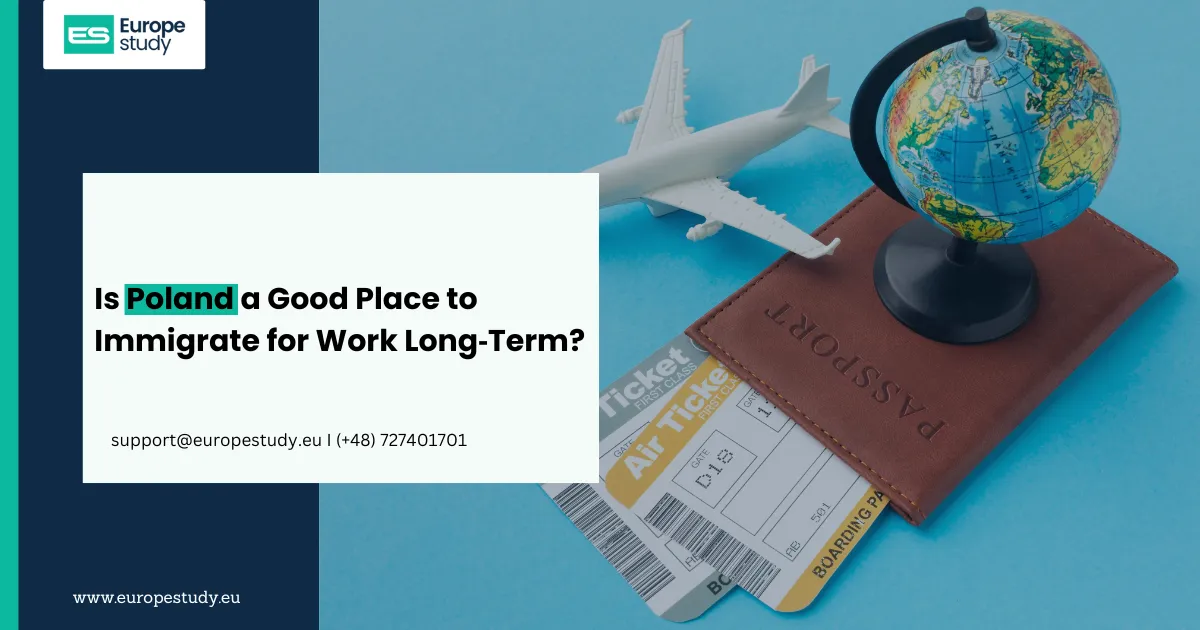
Is Poland a Good Place to Immigrate for Work Long‑Term?
Poland has quietly become one of Europe’s most attractive destinations for international professionals seeking long-term opportunities. With a growing economy, expanding job market, and improving quality of life, Poland offers many reasons to consider it for long-term relocation. But is it the right place for you? In this guide, we break down the key factors that matter for anyone considering immigrating to Poland for work and life.
1. Economic Growth and Job Opportunities
Poland is now one of the fastest-growing economies in the European Union. Its GDP has remained resilient, and it continues to attract foreign investment, particularly in sectors like technology, manufacturing, logistics, and shared services.
The country boasts one of the lowest unemployment rates in Europe—below 3% as of 2025. Major cities like Warsaw, Kraków, Wrocław, Gdańsk, and Poznań are hubs for skilled labor and multinational employers. Foreign workers are in high demand in industries such as:
- Information technology and cybersecurity
- Finance and accounting
- Engineering and construction
- Healthcare and nursing
- Customer support and multilingual services
For skilled workers, especially those who speak English and/or Polish, the job market is very favorable.
2. Cost of Living vs. Salary
While average salaries in Poland are lower than in Western Europe, the cost of living is also considerably lower. The average gross salary in 2025 is around 7,000 PLN per month, though this varies widely depending on experience, profession, and city.
Basic monthly living expenses (excluding rent) range from 2,500 to 3,500 PLN. Renting a one-bedroom apartment in a major city can cost between 2,000 and 4,000 PLN, depending on location and amenities.
This balance between income and living costs makes Poland attractive to mid-level professionals, digital nomads, and skilled migrants looking for a stable, affordable life in Europe.
3. Quality of Life and Cultural Environment
Poland has a high quality of life by European standards. The public transportation system is well-developed, cities are clean and safe, and healthcare services are accessible—especially for those employed legally and contributing to the system.
Culturally, Poland offers a mix of historical charm and modern development. Cities are rich in heritage, music, art, and food. English is widely spoken in urban areas and among younger Poles. That said, learning Polish can significantly improve integration and everyday experiences.
Poland’s central location within the Schengen Area makes it easy to travel to other European countries for work or leisure.
4. Labor Rights and Benefits
Employees in Poland are protected under a strong labor code. Full-time workers are entitled to:
- 20 to 26 days of paid annual leave (depending on work experience)
- Paid sick leave
- Paid maternity and paternity leave
- Pension and retirement contributions through ZUS
- Health insurance coverage
Poland also offers employment stability through long-term contracts, especially in the public and corporate sectors.
5. Work Permits and Legal Immigration Pathways
Non-EU citizens need a valid job offer and employer sponsorship to obtain a work permit and residence card. The most common permit is the Type A work permit, which is tied to a specific job and employer.
The immigration process can be bureaucratic and time-consuming. On average, work and residence permits take 1 to 3 months to process. Delays are common, and many foreigners report challenges dealing with understaffed local offices.
However, Poland has introduced special programs to attract skilled foreign workers, such as:
- Poland Business Harbor for IT professionals and entrepreneurs
- The EU Blue Card for high-skilled migrants
- Sectoral permits for industries facing labor shortages
Despite administrative hurdles, legal immigration is achievable for qualified professionals, especially those with in-demand skills.
6. Long-Term Residency and Citizenship
After legally residing and working in Poland for five years, foreigners can apply for long-term EU resident status. This offers more flexibility in the labor market and less dependency on employer sponsorship.
Citizenship can be applied for after several years of residency (typically 10 years, or fewer in certain cases). The process includes demonstrating knowledge of Polish language, culture, and law.
7. Pros and Cons of Immigrating to Poland for Work
Advantages
- Strong job market for skilled professionals
- Affordable cost of living compared to other EU countries
- Excellent work-life balance and employee rights
- Access to EU healthcare, education, and travel
- Rich culture, safe cities, and central European location
Disadvantages
- Bureaucratic immigration processes can be slow and confusing
- Language barrier can limit integration in smaller towns
- Salaries lower than in Western Europe
- Weather can be harsh in winter months
- Political climate and policy changes can impact foreign workers
Final Thoughts: Is Poland Worth Moving to for Work?
If you are looking for a European country that offers job opportunities, affordable living, and long-term growth potential, Poland is a strong candidate. It may not offer the high salaries of Germany or the UK, but the combination of stability, demand for skilled workers, and overall quality of life makes Poland one of the best places in Central Europe for long-term immigration.
Poland is particularly well-suited for professionals in IT, finance, healthcare, and engineering. With patience for paperwork and a willingness to integrate, many foreigners build successful and fulfilling lives in Poland.
Sources
- Polish Central Statistical Office (GUS)
- Ministry of Family and Social Policy
- OECD Economic Reports on Poland
- European Commission Labour Market Report
- Poland’s Foreign Worker Migration Data 2024–2025





